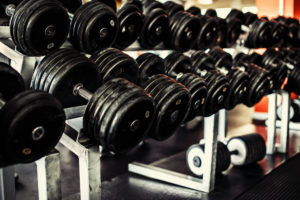We may receive commissions on qualifying purchases made from some of the links on this post.
Top Pick
- Meal Replacement.
- High in vitamins and minerals.
- Very tasty.
I’m not sure who out there never got the memo, but we’re well into the 21st century, where we no longer need to use animals for everything. Protein is included in that.
Here’s what you need to know about the best plant-based protein powder for you, and how you can use it for cruelty-free fitness.
For a quick preview, here are the top picks of vegan protein powders. Below, I’ll expand on the pros and cons of each one in detail.
The Best Plant-Based Protein Powder
So which is the best plant-based protein powder out there? I’ve reviewed my choices here, based on effect, ingredients, and taste.
1. Gnarly Vegan - Plant Protein
Featuring the essential protein you need for active meal replacement or recovery with absolutely no animal-derived ingredients, GNARLY VEGAN combines a plant-based protein blend with 14 essential vitamins and minerals for complete vegan nutrition on the go.
One of the company’s main missions is sustainability as it aggressively cuts back on plastic use. All of their tubbed products are packaged in steel cans, which are recycled at 70% compared to plastic at less than 8%.
- Pros
- A true meal replacement vegan protein with 20 grams of protein, 7 grams of healthy fats, and 9 grams of fiber per serving.
- Contains 14 essential vitamins and minerals to meet your micronutrient needs.
- Pre-and-probiotics to support digestion and gut health.
- Really tasty and comes in two flavors; chocolate and vanilla.
- Comes in a steel can for sustainability.
- Cons
- Since the can is made out of steel, it is irritating to open it without an object.
- High in calories (200 kcl.)
2. Organic Plant-Based Vegan Protein Powder by Optimum Nutrition
Optimum Nutrition has established itself as a leader in pre-workout supplements, and it’s hard to argue why. It contains high-quality ingredients, it’s effective, and customers love it.
This organic plant-based protein powder uses a blend of peas, rice, and sacha inchi to give you 24 grams of complete protein per serving. That means you get 48 percent of your recommended daily intake. You also get 4 grams of BCAAs per serving, plus an impressive 100 percent of your recommended vitamin C intake.
Other ingredients include ancient grains (quinoa, buckwheat, amaranth, millet, and chia), pomegranate powder, cinnamon powder, and more.
- Pros
- Blend forms a complete protein source.
- High protein and vitamin content.
- No GMOs, fillers, or artificial flavors or colors.
- Gluten free.
- Trusted brand with excellent customer satisfaction.
- Affordable.
- Cons
- Has an overwhelmingly sweet, almost unpleasant taste.
- Its texture is a mess. It’s watery and lumpy (how do you even get that right though?).
3. Organic Plant-Based Protein Powder by Orgain
One of the best plant-based protein powders, this one is easy to mix and is rich, creamy, and tasty. Orgain claims that this product is great for young and old alike, but actually, protein powder is unnecessary (at best) and dangerous (at worst) for children. This made me slightly suspicious of it. Other than that little false fact, everything else seems to check out.
One serving will give you 21 grams of protein (42 percent of your recommended daily intake). The protein is blended with peas, brown rice, and chia. You also get 5 grams of fiber, zero sugar, and 150 calories per serving.
- Pros
- Made from organic ingredients.
- Significant protein content.
- Gluten free, kosher, and GMO free.
- Zero sugar.
- Considered the best tasting protein powder by many.
- Cons
- Not a complete protein powder.
- For all the organic ingredients, its vitamin content could be higher.
- Marketing seems misguided, contradicts evidence.
4. Complete Protein by PlantFusion
PlantFusion describes this product as non-dairy, non-whey, non-soy and free of eggs, rice, fish, nuts, shellfish, and artificial flavors and colors. It seems they’ve put a lot of time into a product that’s safe for everyone. But is it any good?
Well, for starters, one serving gives you 21 grams of protein and only 32 percent of your recommended daily intake—an average amount but much lower than the products above.
PlantFusion’s protein sources are peas, artichokes, and algae. This sounds good on paper, but although it’s got promising perspectives, there just isn’t sufficient evidence to support algae as a protein source.
- Pros
- A complete protein powder.
- Hypoallergenic.
- Tastes just fine.
- Cons
- Protein content is significantly lower than competing products.
- Exact algae source is not listed.
- There isn’t enough evidence to support PlantFusion’s formula with certainty.
5. Purely Inspired Organic Protein Shake Powder
For a brand that makes the bold claim of being America’s number one selling organic protein, Purely Inspired seems more set on being trendy than anything else. This product’s ingredients are not immediately made clear, but you will get many recipes for it.
Once you find the ingredients, you’ll see that the protein content is a bit low (20 grams, or 36 percent per serving). There is 28 percent of your dietary fiber, though, which is nice. The main proteins are pea and brown rice, but there are other vegetable blends included too.
- Pros
- Organic, GMO free, and gluten free.
- It uses interesting vegetable blends for extra nutrition.
- Cons
- Protein content is lower than others.
- Could contain other allergens.
6. Vega Sport Premium Protein
Vega sport, like Purely Inspired, claims to be the number one selling brand in the USA. One serving of this gives you 30 grams of protein—an impressive 43 percent of your recommended daily intake. You also get 5 grams of BCAAs.
The protein is sourced from peas, pumpkin seeds, and sunflower seeds. To be taken post-workout, it’s made to give you fuel for your exercise. I like that the container is made out of 100 percent recycled plastic.
- Pros
- High protein content.
- No GMOs or artificial flavors or colors.
- Contains pumpkin and sunflower seeds.
- Cons
- Has a reputation for heavy metal toxins.
- Has a chemical taste to it.
7. Naked Pea, Vegan Pea Protein Isolate by Naked Nutrition
This protein shake immediately stands out because it only has one ingredient listed: yellow peas. Naked nutrition stays true to its name, and is brutally honest about the components of their product, including the miniscule traces of heavy metals in it.
It’s important to note that although it’s listed as gluten free, there are trace amounts of gluten too.
As for the protein, you get an impressive amount from this pea source. One serving gives you 27 grams, or a whopping 54 percent of your recommended daily intake. Kudos to Naked Nutrition for that.
- Pros
- Impressively high protein content.
- Full disclosure of ingredients and components.
- Low sugar.
- Low calories.
- No GMOs, fillers, or artificial ingredients.
- Cons
- Toxins detected in product.
- Contains trace amounts of gluten.
- Taste and texture is lacking.
Informational guide to Plant-Based Protein
Protein Explained
If, like me, you suck at science, trying to understand protein perfectly will do nothing but give you a headache, so let’s skip science class for now. In layman’s terms, proteins are the building blocks of your body. They create, develop, maintain, replace, and fuel your muscles and tissues.
It’s no wonder that they are vital to health then, but it goes even further. Protein is not a single thing. It comes in different shapes and sizes and carries with it varying functions.
Types of Proteins
There are three basic types of protein, each significant in health:
- Enzymes are best defined as catalysts. They speed up and are responsible for almost every single chemical reaction that happens in your cells.
- Peptide hormones regulate various biological functions including appetite, metabolism, reproduction, stress, insulin, and even breast milk production.
- Amino acids are not necessarily proteins themselves, but they are what protein is made of. Your body breaks protein down into amino acids to maintain muscle tissue (and oddly enough, to produce more proteins).
Protein Deficiency
If your body doesn’t get enough protein, it can suffer many painful and dangerous effects including:
- Muscle weakness.
- Cramps and pain.
- Damaged mental health.
- Organ failure.
- Weight loss.
- Skin irritation.
- Hair loss.
- Tooth loss.
- Fatigue.
- Swelling.
- High blood pressure.
- Loss of muscle mass.
- Weakened immunities.
Protein in Fitness
Based on the above, it’s easy to see why protein is such an important part of fitness, especially weight training. Your muscles are literally made of protein, and without it, you have no hope of muscle growth, regeneration, strength, or mass.
Protein also contributes to our energy levels, and it has become all the rage in high-intensity workouts.
These are all contributing factors to why protein—particularly animal protein—is consumed almost excessively in fitness communities. But is that really necessary? What about vegetarians, vegans, or other fitness enthusiasts who can’t consume animal-based proteins?
Where Does Protein Come From?
Our bodies produce protein all on their own, but there are some proteins—important ones—that we can’t get anywhere else except from food. They’re called essential amino acids, and they’re responsible for protein synthesis, your body’s ability to absorb nutrients, and tissue production and regeneration.
It’s a myth that protein can only be obtained through animal products, but it is true that animal proteins are the best proteins. They’re called complete proteins because they contain all nine essential amino acids. There are few plant-based proteins known for this. The most common one is soy.
The good news is that if you can’t (or won’t) eat animal products, you don’t have to eat a truckload of soy to compensate, or go without.
Just grab a plant-based protein powder.
What to Look for in a Plant-Based Protein Powder
First and foremost, when searching for a protein powder, you need to pay attention to the protein it contains. Many protein supplements use whey, which is a dairy by-product and so is not acceptable for vegans.
There was a mild controversy in which soy protein came under fire for a number of reasons. Accusations spread that it contained GMOs, and that it fiddled with feminine hormones in men. Evidence shows that this is not true and that, as with everything else, moderation is key.
Rice, pea, and hemp proteins are healthy plant-based options (and good alternatives to soy protein), but keep in mind that they are not complete proteins.
To get everything you need, you’ll have to take blended plant proteins, which typically cost more.
Supplements that contain branched-chain amino acids (BCAAs) will assist with muscle growth, recovery, and weight loss. Just make sure that your specific powder is plant-based, as they won’t always be.
Creatine is not a protein, but a compound that behaves like one. While it shouldn’t replace your protein intake, it can supplement it. It’s a good choice for vegans as well, but as above, check that your brand is vegan, just to be sure.
You’ll also want to make sure that your protein powder contains no fillers, artificial colorants or flavorings, or toxins due to preservatives and pesticides.
Conclusion
Optimum Nutrition is my personal favorite because it’s simply an excellent product. You get what you need from it without the (often dishonest) song and dance routine other brands use to pull you in.
Its protein content is sufficient (not too low, like Orgain, or a bit too high as with Naked Nutrition). It’s got a good blend of ingredients and is genuinely vegan.
It helps that it’s a trusted brand too. If you are looking for the best plant-based protein supplement, I suggest going with this one. The proof is in the product.















